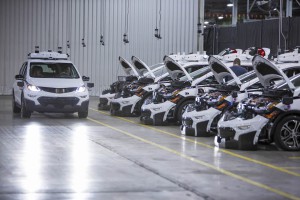
GM Chairman and CEO Mary Barra shows off one of the 130 new self-driving Bolt EVs produced at its Orion Assembly plant.
General Motors announced it has finished building 130 self-driving vehicles for its San Francisco-based Cruise Automation unit to test its system for automated driving on roads in California, Arizona and Michigan.
“This production milestone brings us one step closer to making our vision of personal mobility a reality,” said GM Chairman and CEO Mary Barra.
The new batch of Chevrolet Bolt electric test vehicles built at its Orion Assembly plant outside Detroit is equipped with the latest generation of self-driving technology and will join the more than 50 Bolt EVs with an older version of the system GM now has operating in test fleets in San Francisco; Scottsdale, Arizona; and Detroit, GM officials said.
“Expansion of our real-world test fleet will help ensure that our self-driving vehicles meet the same strict standards for safety and quality that we build into all of our vehicles,” she added.
(GM’s Reuss predicts company will be first with a profitable EV. For the story, Click Here.)
The development of autonomous vehicles has turned into a global competition, which has attracted not only century-old, traditional automakers such GM and Ford but also new-age tech companies such as Alphabet and its Google-inspired subsidiary, Waymo, as well as Apple and Uber as well as newcomers such as the Chinese tech-giant, Baidu, which appears intent developing its own self-driving vehicles.

GM built 130 new autonomous Bolts off its assembly line at a plant near Detroit. They'll be testing in Michigan, California and Arizona.
However, the completion of the 130 Chevrolet Bolts on a conventional assembly line highlighted what Barra last week told GM shareholders represents the company’s major advantage in the race to build fully autonomous vehicles – its broad experience in integrating sophisticated technology into a vehicle that can be processed on a state-of-the-art assembly line.
“The level of integration in these test vehicles is on par with any of our production vehicles, and that is a great advantage for us. In fact, no other company today has the unique and necessary combination of technology, engineering and manufacturing ability to build autonomous vehicles at scale,” Barra said.
(Click Here to see more about GM hustling to get its first EV on the road in China.)
As a result, these self-driving Bolt EV test vehicles leave this factory as state-of-the-art autonomous vehicles, making GM became the first company to assemble self-driving test vehicles in a mass-production facility.
The self-driving Chevrolet Bolt EVs feature GM’s latest array of equipment, including LIDAR, cameras, sensors and other hardware designed to accelerate development of a safe and reliable fully autonomous vehicle, GM officials
“To achieve what we want from self-driving cars, we must deploy them at scale,” said Kyle Vogt, CEO of San Francisco-based Cruise Automation, which GM acquired last year and recently turned into a stand-alone subsidiary for responsibility for its autonomous vehicle business.
(To see what makes GM vehicles the “most American,” Click Here.)
“By developing the next-generation self-driving platform in San Francisco and manufacturing these cars in Michigan, we are creating the safest and most consistent conditions to bring our cars to the most challenging urban roads that we can find,” Vogt added.
